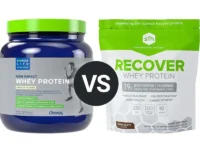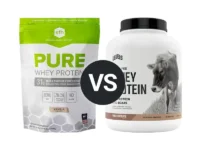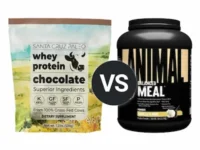Knowledge BaseYou're Questions Answered
What are the main ingredients in paleo protein powder?
Paleo protein powders typically contain ingredients that are considered "paleo-friendly," meaning they are similar to what our ancestors would have eaten during the Paleolithic era. Some common ingredients found in paleo protein powders include:
- Protein sources: Paleo protein powders typically use animal-based proteins like whey, casein, or egg whites. However, some brands also use plant-based protein sources like hemp, pea, or brown rice protein. Animal-based proteins tend to be more complete and easily digestible, while plant-based proteins may provide additional benefits like fiber and antioxidants.
- Natural sweeteners: Many paleo protein powders use natural sweeteners like stevia, monk fruit, or coconut sugar instead of artificial sweeteners like sucralose or aspartame. Natural sweeteners are generally considered safer and healthier alternatives to artificial sweeteners.
- Paleo-friendly ingredients: Many paleo protein powders contain additional ingredients like coconut flour, chia seeds, flaxseeds, or coconut oil to enhance the nutritional profile and add extra flavor. These ingredients are all considered "paleo-friendly" and may provide additional health benefits like fiber, healthy fats, and omega-3 fatty acids.
It's important to note that not all paleo protein powders are created equal, and the exact ingredients and nutritional profile may vary depending on the brand and product. It's important to read the label carefully and choose a product that meets your individual needs and preferences.
One study compared the effects of whey protein and pea protein on muscle growth in resistance-trained young men and found that both protein sources were equally effective in increasing muscle thickness and strength (Babault et al., 2015). Another study compared the effects of whey protein and egg protein on muscle protein synthesis in healthy young men and found that both protein sources were similarly effective in stimulating muscle protein synthesis (Van Vliet et al., 2017).
- Babault, N., Païzis, C., Deley, G., Guérin-Deremaux, L., Saniez, M. H., Lefranc-Millot, C., & Allaert, F. A. (2015). Pea proteins oral supplementation promotes muscle thickness gains during resistance training: a double-blind, randomized, Placebo-controlled clinical trial vs. Whey protein. Journal of the International Society of Sports Nutrition, 12(1), 3.
- Van Vliet, S., Burd, N. A., & Van Loon, L. J. (2017). The skeletal muscle anabolic response to plant- versus animal-based protein consumption. The Journal of nutrition, 147(3), 271-276.
Related Questions
Related Reviews

Your Answer
We are a participant in the Amazon Services LLC Associates Program, an affiliate advertising program designed to provide a means for us to earn fees by linking to Amazon.com and affiliated sites.


